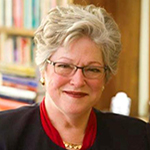By Molly T. Marshall
 It has been a cruel year, and we all struggle to make sense of the realities of our times. “Living in our own time, wisely” is a key spiritual practice, in the words of Diana Butler Bass, and lest we be thought irrelevant or glib, we must speak of the violence and injustice that stain humanity. Yet, in the midst of it all, we must have the courage to risk joy.
It has been a cruel year, and we all struggle to make sense of the realities of our times. “Living in our own time, wisely” is a key spiritual practice, in the words of Diana Butler Bass, and lest we be thought irrelevant or glib, we must speak of the violence and injustice that stain humanity. Yet, in the midst of it all, we must have the courage to risk joy.
Advent has been even more poignant this year, as the virtues of hope, peace, joy, and love seem more aspirational than achievable. And, truthfully, that is the case. We are broken and sinful people, and we cannot achieve them without radical intervention in the world, which is the story of the incarnation.
In Jesus’ time many had given up hope that God would ever deliver on the promise of a Savior. But in patient mercy, God came; in the fullness of time, the Word became flesh. And now, the thin membrane that lies between heaven and earth is made translucent as the light of shared glory, human and divine, shines forth.
In the fragility of the newborn hanging by a slender umbilical cord, God came. God’s gift to the world was God’s presence, coming in the humility of a helpless, dependent infant. In the insistent cry of the baby, God says, “Take care of me.” Now God is made after our likeness, a remarkable inversion of the creation story.
Luther wrote: “For our sakes he has taken flesh and blood from a woman, that his birth might become our birth. … This is the way to observe this feast — that Christ be formed in us.” He is talking about a new possibility, that humans become a “fitting vehicle to bear the divine,” as H. Wheeler Robinson put it.
We tend to romanticize the story of Jesus’ birth, ignoring the pain and life-threatening conditions. Could it be we have seen so many Christmas pageants in which children play the parts that we have forgotten what demanding, grown-up work this really was? (I still have my nose out of joint that I never got to play Mary in the Christmas play, most likely because I could not sit in wordless contemplation!)
God comes, and Jesus is born. Part of what Mary would ponder in her heart may be the irony of the “Son of the Most High” coming into the world like other babies born to poor parents. Harsh conditions notwithstanding, the baby came safely, in due time, and heaven rejoiced.
Joy overtook others, too. Luke lets the shepherds receive the glorious birth announcement, but also be the special emissaries, first to the parents, then to the whole community. They had the joy of being God’s chosen “town criers” for the biggest news ever.
They must have chuckled a bit at the sheer irony of God sending the angels to them rather than to Herod’s palace, the temple, or the headquarters of the Roman procurator. Why should they hear the melodious tones of the heavenly choir and be given such precise instructions about the birth of the Messiah? Luke teaches us that God delights to use what the world scorns, and thereby allows unexpected joy to break in.
Joy, that fruit of the Spirit second only to love, is not a goal. It comes as we pursue hopeful actions; it arises out of acting our way into belief. It often surprises us, as C.S. Lewis observed, as we discover connections to something, Someone, beyond ourselves. It is God’s gift, and it will come as we take care of what God has entrusted to us. We are God’s means of embrace in this world, extending loving arms and helpful hands to those for whom joy seems distant.
Willie Jennings has described joy as an act of resistance against despair. Truthfully, it would be easier to despair than hold out for joy, for the evidence seems incontrovertible. Too many young lives taken, too many promises broken, and too many trials unsatisfactorily resolved, and we are tempted to bow our heads in despair.
Yet, there are signs that joy is overtaking us. Many of us have carried a mindfulness that put some of the consumption of the season into better perspective, especially as we think of economic disparities that rend the human fabric. We have tracked new paths of generosity and self-giving presence in our communities and through our giving.
As we remember the babe of Bethlehem, we also seek to follow the politically engaged prophet who said things could not, would not, remain the same. A great leveling is on the horizon, and God will collaborate with willing hearts to make the rough places plain. Even the pursuit of such justice will bring great joy.
